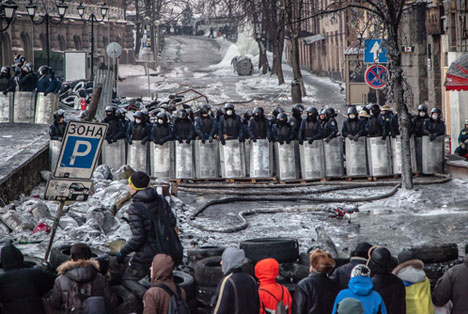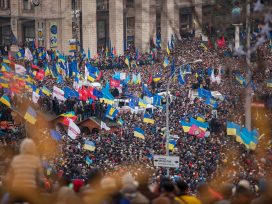Monopoly on violence vs. the right to rebel
A surge of state violence and the subsequent curtailment of citizens’ right to protest, combined with an expansion of the authorities’ right to use force: Kirill Rogov reveals how the “Putin doctrine” previously applied to protests in Russia brought Ukraine to the brink of civil war.
Ukraine is on the threshold of civil war. Only a few years ago such a turn of events would have seemed farfetched if not unthinkable. What is it that has made this scenario possible today? What kind of mechanism has led to the current situation?

Kyiv, Ukraine, 24 January 2014: lanes of riot police face protesters during mass protests on Grushevskogo Street. Photo: AlexandCo Studio. Source: AlexandCo Studio/Shutterstock
One can assume that, in the Kremlin, they are rubbing their hands with glee as the officious Russian media comment on events in Ukraine and circle round one, single idea: “Just look at what so-called ‘peaceful protest’ leads to!”
And indeed, irrespective of the extent to which the Kremlin is participating in the design of tactics for the Yanukovych administration’s confrontation with the Kyiv protesters, the history of this confrontation clearly reflects the underlying ideas of the “Putin doctrine”.
When president Viktor Yanukovych was first confronted by the biggest mass demonstrations since the Orange Revolution, following his refusal to sign the Association Agreement with the EU, he initially chose simply to ignore them. While signing agreements with president Vladimir Putin, he effectively said as much: let them stand there in the Maidan until the spring. And indeed, it is a fact that peaceful protest has significant benefits in terms of soft power but, at the same time, possesses no effective levers to influence a situation. The standoff is confined to the sphere of moral politics. If the language of moral politics is ignored, the energy of a protest is soon driven into a corner – as proven during the course of many protests worldwide in recent years.
For a protest to hold, it has to escalate, or people begin to go home in a state of complete frustration, as though they had been publicly humiliated. In order to prevent the escalation of protest, you have to make a show of strength, take action that will frighten or intimidate. Finally, as the strategy unravels, a third element follows: the passing of laws significantly limiting the rights of citizens to protest and increasing the right of the authorities to use force against demonstrators.
Kremlin know-how
This cocktail – which includes ignoring peaceful protest, followed by an intimidating demonstration of force and a legislative curtailment of citizens’ rights to protest, combined with an expansion of the authorities’ right to use force – is the know-how which, according to the Kremlin, helped Putin to deal so successfully with protests in Russia in 2011 and 2012. Initially the Kremlin wholly ignored the demands of protesters in Moscow to review the results of the December 2011 elections. Then it took action to intimidate, by provoking clashes between demonstrators and the militia on 6 May 2012. Subsequently it passed a legal package through the State Duma, limiting possibilities for peaceful demonstration and increasing the severity of punishment, even for the most minor breaches of the new laws.
This tactic has been precisely reproduced in the “Yanukovych scenario”. The phase of ignoring protest was abruptly replaced by the beating of students in their encampment, at night, by Berkut special police units. And on 16 January a package of laws was swiftly passed. These are now known in Ukraine as the “dictatorship laws”.
The state and natural law
Two key ideas can be detected behind these tactics. The first is the notion of the state’s monopoly on violence, the second, an understanding of law exclusively as positive law. Within the bounds of this interpretation the law is that which is written down as Law and passed by the legislator. This understanding of law was historically a feature of feudal and absolutist systems, when the only source of law was the sovereign ruler.
In a modern state, the monopoly on violence – which lies behind the foundation of any state – is checked by the concept of natural law. This means that what is lawful is not defined by whatever arbitrary exercise the legislator chooses to undertake. Instead, the law may not infringe the natural rights of citizens, which are theirs from birth. Nor may it depart from society’s understanding of what justice is, because that understanding is based on the idea of inalienable natural rights. The check on state violence emerges particularly from the fact that within the framework of representative democracy, the legislator is not a source of power, but a representative of the power of the people. The notion of full people’s power is fundamental to most modern constitutions, including those of Russia and Ukraine.
It follows from this that neither the Russian Duma nor the Ukrainian Rada can pass laws curtailing the basic rights of citizens. For, according to the constitution, these very citizens have endowed them with the power to legislate and rule. Limiting the powers of citizens is effectively usurpation, an anti-constitutional coup. This holds true even if this curtailment is introduced with reference to the will of a “majority” (as so often happens). A parliamentary majority cannot take a legitimate decision concerning the limitation of the rights of citizens, because the source of power lies not with the national majority but with the entire aggregate of free citizens who possess these rights from birth.
That is why the concept of natural law – that is to say the concept of the primacy of the natural rights of citizens over the right of the state to violence – presupposes the right to rebellion (as has been noted on a number of occasions in recent days). This was formulated in the famous documents of the Enlightenment, which advanced the notion of natural law and the sovereignty of the nation: the Declaration of the Rights of Man (1789), the French Constitution (1793) and the US Declaration of Independence (1776).
The right to rebellion is not a call or a slogan, but a term describing a particular contradiction within the law. The essence of it lies in the fact that the state – the nature of which lies in a monopoly on the use of force – loses its legitimacy in the minds of citizens, if it violates natural law. Thereby, any violence to which the state has resorted ceases to be lawful as well. This contradiction is directly described in the preamble to the Universal Declaration of Human Rights passed by the UN: “It is essential, if man is not to be compelled to have recourse, as a last resort, to rebellion against tyranny and oppression, that human rights should be protected by the rule of law.”
The destruction of a monopoly
The “Putin doctrine” is founded on the archaic assumption that the state’s right to use force takes priority over the inalienable rights of citizens. Here, the state’s right to violence is understood as the source and basis of power. This is reflected not only in Putin’s exceptional willingness to resort to force – not as a final argument, but as a preventive measure – and also in his genuine scorn for the idea of negotiation with political opponents or compromise to accommodate anybody’s demands. To Putin, the very idea of citizens’ demands appears to undermine the monopoly on the use of force which he has appropriated. In the full spirit of feudalism and absolutism, he believes that citizens have the right only to plead and present petitions. By this, he acknowledges that the state’s right to violence takes priority over citizens’ rights.
Putin regards himself as an “statist” on the basis that he gives the state’s right to exercise force priority over the rights of individual citizens. In reality however, the consequent abuse of the government monopoly on violence leads to a subversion of this monopoly, that is to say – in the final instance – it leads to a subversion of the state. This is what we are seeing in Ukraine today.
As a result, in Kyiv it is not the forces of state law and order which are in active conflict with the opposition. No. On the streets of Kyiv a concrete group of people (the protesters on the Maidan) are at war with another group: the Berkut, the so-called titushki (paid thugs acting under the auspices of the police), and mysterious bands of men who kidnap activists. The mechanism has been brought into play: this is the start of civil war.
The Kremlin is no doubt secure in the knowledge that events in Kyiv will prove an excellent lesson to the Russian population. The idea of the legitimacy of mass street protests has gained strength in the public consciousness since the Moscow protests of 2011-2012. This is a serious worry for the Kremlin. And indeed, in the short term, it is most likely to be as the Kremlin predicts. Events in the Ukraine will intimidate Russian citizens. In the mid-term however, against the backcloth of a continuing fall in support for the current political regime, the delegitimation of the state violence in Kyiv today is bound to exercise a stronger influence on mass consciousness in Russia. And this is likely to obscure the short-term effect.
The crisis of legitimacy faced by post-Soviet, neopatrimonial, clan-based regimes formed over the past twenty years is, to all appearances, a systemic phenomenon in the post-Soviet space, coinciding with progressively worsening conditions of economic development in the region. As so many examples show, in conditions where legitimacy is weakened or lost, the reliance of existing authorities on the use of force becomes a trigger for the collapse of the monopoly on violence, leading to the headlong fall of the regime.
Published 3 February 2014
Original in Russian
Translated by
Irena Maryniak
First published by Novaya Gazeta, 26 January 2014 (Russian version); Eurozine (English version)
Contributed by Transit © Kirill Rogov Eurozine
PDF/PRINTPublished in
In collaboration with
In focal points
Newsletter
Subscribe to know what’s worth thinking about.
Related Articles

Talk of demilitarization and mobilization divides opinion. Could giving women and other feminized groups more agency in wartime decision-making flip their traditionally passive role, providing relief from trauma and injustice?

From Bosnia to Afghanistan, the neoliberal peace-building model has compounded conflicts and inequalities by eroding the core function of states. But in Ukraine, the co-optation of the recovery process by private economic interests is being taken to a whole new level.






